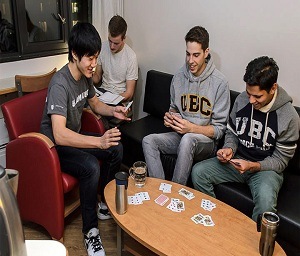Hãy nhập câu hỏi của bạn vào đây, nếu là tài khoản VIP, bạn sẽ được ưu tiên trả lời.

Dear David,
I sympathize with your dissatisfaction with your roommate and I also thank you for your information about your roommate
As I know, your roommate is a new student at our college. Many new students are often unfamiliar with collective life. Therefore, they can make other students discontent, particularly for former's. If I were you, I would talk honestly with him on the issues with which you are not satisfied. Then he will possibly change his life style, so that you both will understand and respect each other.
Actually, at present, our dormitory still has two rooms.If you do not like it here, you can move room at the end of this month. However, there is no single room anymore and you must share a room with someone else. But you do not worry. The roommate you will live with is a good student. He studies hard. He is one of the best students who was rewarded one of by the college for good achievements in the last semester. Therefore, I hope you and your future roommate can get on well with and support each other in study.
As a person in charge of the accommodation, tomorrow, I will meet your roommate and talk with him about your complaint to help him recognize his fault and avoid disturbing you. If he still does not change his habits, I will force him to move out of the dormitory. I hope it will be of benefit to you and others.
Finally, wish you would get along well with new your roommate. Besides, I hope that you will do well in your exams next term. If you would like any further information about this, you can come to my office or email: leetran@abccollege.com
I am looking forward to hearing from you soon.
Yours sincerely,
Lee Tran

Đổi câu trực tiếp sang gián tiếp :
1) When can I see the doctor ?
-> He asked me when he could see the doctor.
2) What's the name of the college?
-> She asked me what the name of the college was.
3) How many students are there in the college?
-> He asked me how many students there were in the college.
4) How far is it to the school?
-> They asked me how far it was to the school.
5) How do you go to school?
-> She asked me how I went to school.
6) How did you get to school?
-> He asked me how I had got to school.
7) Who do you want to talk to?
-> They asked me who I wanted to talk to.
8)Where are you from?
-> She asked me where I was from.
9) Why do you learn English ?
-> He asked me why I learned English.
10) Which class are you in?
-> He asked me which class I was in.

1, We have the first a twenty-minute break after three lessons
2,The teacher is very angry because the students are taking to music in class
3,what kind of food would you like for lunch?
4, Are you want to buy the those souvenirs ?
5, growing children shouldn't drink tea and coffee because they are not good for them.

1.Yes i do, i just simply fall in love with the peace there
2. They are friendly, open and helpful
3. They often play outdoor-game such as hide and seek, catching...
4. It is now more places of entertainment, more shops, service and oppotunities for employment, near cinema or shopping mall. And it is also noisier
HỌC TỐT NHA ![]()

I. Fill in “where, whose, who, which, when, why”.
Buying a present for someone is often a tricky business. The first thing (1) …………which……………… you have to decide is what to buy and the shop (2) …………where……………… you should go to buy it. Then you might want to buy a joint present with a friend, so you have to find a time (3) …………when……………… you are both free. It is probably most difficult buying a present for someone (4) …………who……………… you don’t know very well and (5) ………which………………… tastes you know little about. You have to try to find something (6) ………which………………… you think they would like. However, it is also no easy job buying a present for a close member of your family, such as your mother. I never know what excuse to tell my mother when I go out. I can’t tell her the reason (7) …………why………………
I’m going out because I want to surprise her on the big day. Still, it is worth all the trouble just to see the look of pleasure on someone’s face the moment (8) ……………when…………… they receive your gift.

Read the passage below and choose the best answers.
Each nation has many good people who take care of others. For example, some of high school and college students in the United States often spend many hours as volunteers in hospitals, orphanages or home for the elderly. They read books to the people in these places, or they just visit them and play games with them or listen to their problems. Other young volunteers go and work in the homes of people who are sick or old. They paint, clean up, or repair their houses, or the shopping or mow their lawns. For boys who no longer have fathers there is an organization called Big Brothers. College students and other men take these boys to baseball games or on fishing trips and help them to get to know things that boys usually learn from their fathers. Each city has a number of clubs where boys and girls can go and play games or learn crafts. Some of these clubs show movies or organize short trips to the mountains, the beaches, museums or other places of interest. Most of these clubs use a lot of high school and college students as volunteers because they are young enough to understand the problems of younger boys and girls. Volunteers believe that some of the happiest people in the world are those who help to bring happiness to others.
1. What do volunteers usually do to help those who are sick or old in their homes?
A. They mow lawns, do shopping, and clean up their houses.
B. They cook, sew, and wash their clothes.
C. They tell them stories and sing and dance for them.
D. They take them to baseball games.
2. What do they help boys whose fathers do not live with them?
A. To get to know things about their fathers.
B. To get to know things that boys want from their fathers.
C. To learn things that boys usually learn from their fathers.
D. To learn things about their fathers.
3. Which activity is NOT available for the students at the clubs?
A. playing games B. watching films C. going to interesting places D. learning photography
4. Why do they use many high school and college students as volunteers? Because......
A. they have a lot of free time.
B. they can understand the problems of younger boys and girls.
C. they know how to do the work.
D. they are good at playing games and learning crafts.
5. What do volunteers believe?
A. In order to make others happy, they have got to be unhappy.
B. The happiest people in the world are those who make themselves happy.
C. The happiest people in the world are those who are young and healthy.
D. Bringing happiness to others makes them the happiest people in the world

1, runs / to be / leading / get
2, hear / tell / heart / saw
3, enter / standing / took / cried
4, was / to get / could cook / saw / to take / felt / looked / saw / was / must have known
5, was born / moved / entered / had contributed / appeared / was living
6, have been / lives / is expanding / building

Supply the correct verb forms.
1. He (run) was running as fast as he could, but he realized he was not strong enough (be) to be a good marathon runner. In the distance he could just make out the shapes of the (lead) leading runners, (get) getting further ahead every minute.
2. Every day you can (hear) hear something interesting t school. When you come home after classes, you often (tell) tell your parents what you (hear) have heard and (see) seen at school. Two friends went on a trip to London.
3. They (enter) entered restaurant for dinner. On the table (stand) stood a jar of mustard. Not having seen mustard before, one of them (take) took a spoonful into his mouth. Years immediately filled his eyes and his friend asked him what he (cry) was crying about.
4. In two minutes I (be) was up the tree, but It was very difficult (get) to get to the nest. When at last I got there and (can look) could look into the nest, I (see) saw the two young eagles and also some food for them-meat and finish. When I tried (take) to take the young eagles out of the nest, I suddenly (feel) felt a terrible pain in the back of my head. I (look) looked round and (see) saw the mother eagle. And she (be) was ready to make a second attack. You ( must know) must know how strong these eagles are.
5. Eric (bear) was born in 1903 in India where his father worked for the civil service. The family (move) moved to England in 1907 and his 1917 Eric (enter) entered Eton where he (contribute) contributed regularly to the college magazine. His first article (appear) appeared in Lemon in October 1928 while he (live) was living in Paris.
6. Jack Cooper (be) have been a production manager at Weston Aeronautics for ten years now. He (live) is living in a small house in the suburbs of Bristol with his wife, Peggy. At the moment, Weston (expand) is expanding into Europe and they (build) have built a new factory in Toulouse.


Dịch nhé
bạn muốn bắt đầu một tạp chí hàng tháng bằng tiếng Anh dành cho sinh viên tại trường đại học nơi bạn đang theo học. bắt đầu tạp chí-số đầu tiên sẽ bao gồm những gì-hỗ trợ và giúp đỡ tài chính bạn cần từ trường đại học